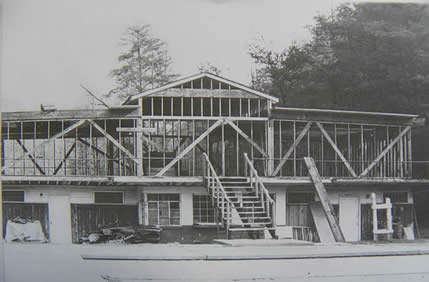From the Daily Yonder's Tim Marema comes an in-depth report about a conversation between local leaders about Appalachian economies in a post-coal future. This conversation, whcih took place in Whitesburg, preceded "Transformational Ideas" session at the East Kentucky Leadership Conference that we wrote about last week.
Many rural areas face fundamental shifts in their economies. In Kentucky, community advocates and scholars come together to project a future less reliant on Old King Coal.
Helen Lewis has a simple idea for transforming the Central Appalachian economy.
“Promise every child a clean glass of water,” says the sociologist and founder of the field of Appalachian Studies.
It sounds easy, but Lewis quickly describes the breadth of the problem and the potential economic impact of fixing it.
“You would have to clean up coal,” she said. “You would have to stop mountaintop removal [coal mining]. A lot of money could go into an absolutely good project that would hire a lot of people – if you could get into restoring the watersheds of this whole region.
“You have to do all of that to promise a child a clean glass of water.”
Lewis’s idea was one of several brought forward during a roundtable discussion April 25 on economic transformation for east Kentucky, organized by the Center for Rural Strategies (publisher of the Daily Yonder) and the Mountain Association for Community Economic Development.
The dozen participants at the gathering in Whitesburg, Ky., represented economic development nonprofits, educational institutions, community organizers, media makers, private philanthropy, and a legal aid firm. A second day of discussions took this small group’s ideas to a regional conference, the East Kentucky Leadership Conference, in Prestonsburg, Ky., where approximately 75 other coalfields leaders discussed the proposals.
The goal of the discussions was to create an “idea bank” of economic renewal projects to contribute to building a healthier economy for the region.
By the end of the sessions, the “bank” had a number of deposits – ideas about increasing local food production, expanding the forest economy, improving access to affordable broadband, building the health care economy, and expanding local and national philanthropy. There were also several ideas, such as Lewis’s clean water plan, that were aimed at tapping private and public funds to clean up the region’s environment, which has been devastated by more than a century of intensive coal mining.
Participants purposefully focused on a wide variety of ideas, rather than trying to line out a large solution, such as recruiting a large manufacturer.
There’s not a single answer to east Kentucky economic problems, says Justin Maxson, president of MACED, a community development nonprofit that has encouraged a range of economic alternatives, including sustainable forestry, wood products manufacturing, alternative energy production, and other small-business development.
“We don’t need a silver bullet,” he said. “We need a bunch of silver BBs.”
Whatever the gauge of the ammunition, there needs to be a lot of it. East Kentucky ranks among the poorest, least healthy regions in the nation. The Fifth Congressional District, which covers southeast Kentucky, is ranked last in the nation in well being, according to a national index that measures prosperity, health, and residents’ outlook. It’s also the nation’s most rural congressional district by percentage of population.
For the past 100 years, the public discussion of the economy of east Kentucky has been synonymous with coal. But that’s changing – slowly.
MACED. This cha rt (at left) shows changes in Eastern Kentucky's coal production since 1980 and projected changes through 2035. Kentucky jobs in mining are half what they were in 1984 and production is declining.
rt (at left) shows changes in Eastern Kentucky's coal production since 1980 and projected changes through 2035. Kentucky jobs in mining are half what they were in 1984 and production is declining.
Since 1984 the state has lost half its coal mining jobs. Today, miners number
fewer than 15,000 in the state. Analysts predict more decline in coal production in the years ahead. Nonetheless, the culture of coal mining, along with its environmental and political legacy, remains strong.
“If coal mining stopped tomorrow, you’d still be trying to deal with the footprint of coal,” said Brady Deaton Jr., an agricultural economist at University of Guelph (Ontario, Canada) who worked on water and sewer projects in east Kentucky in the 1990s. Deaton said the kind of economic-transition discussion occurring in the coalfields is a familiar one in other rural areas. The South lost many of its factory jobs to overseas manufacturing, and the Midwest lost agricultural jobs through consolidation and mechanization.
The challenge is how to discuss economic alternatives to coal within a region that still views itself as coal country. (The state sells a
“Friends of Coal” specialized license plate, with proceeds going to the Kentucky Coal Association, an industry group. The organization says the state has sold 50,000 of the plates – that’s more than three plates for every mining job in Kentucky.)
MACED is proposing that Kentucky do a better job of using coal severance-tax revenue to support economic transition. The state started taxing mined minerals in the 1970s. But too much of the revenue goes to address short-term needs, not accomplish long-term economic change, says Jason Bailey, research and policy director of MACED. What is more, coal production is expected to fall in the future, which will reduce revenue from the tax.
To create a more stable source of economic-development funding, MACED has proposed that the state set aside 1 percentage point of the tax (currently at 4.5 percent) for a permanent fund or endowment. That would mean a little less money for local-government projects for about 10 years. After that, east Kentucky would start to see a net gain in economic development funding from the fund, according to MACED’s analysis. By 2035 the fund’s value would reach $735 million and generate $31 million a year for economic development,
That kind of money could buy a lot of BBs.
 Shawn Poynter/Center for Rural Strategies A dozen commu
Shawn Poynter/Center for Rural Strategies A dozen commu
nity organizers, economic development specialists, educators, and others (pictured right) gathered in Whitesburg, Ky., to discuss the Appalachian economy April 25.
Economic transition ideas that came out of the gathering in Whitesburg fell into four categories:
• Supporting small businesses and entrepreneurial initiatives such as “eco-agri-tourism,” woodlot production, professional arts initiatives, and local food production. Nancy Adams ofPine Mountain Settlement School mentioned the school’s participation in Grow Appalachia, a collaboration with Kentucky’s Berea College that is expanding gardening to improve nutrition and, perhaps, increase cas
h income.
• Improving infrastructure and the environment to make the region more attractive to businesses. Dee Davis, president of the Center for Rural Strategies, cited improving broadband infrastructure as a necessary ingredient in any long-range development plan. Others mentioned retrofitting public and private structures to make them more energy efficient, remediating lands damaged by mining, restoring watersheds, and improving housing stock.
• Building on the health-care economy, which could be affected by federal health-insurance reform.
• Generating new revenue for economic and community development. Besides MACED’s coal severance tax idea, participants also discussed the need for expanding the number and size of local community foundations and getting national foundations to invest more heavily in the region.
Notably absent from the discussion were any proposals to encourage more industrial parks or industrial recruitment. Such approaches, including hefty tax breaks, have been a mainstay of Kentucky economic development policy for decades.
MACED staff member Carrie Ray said she’s heard local government officials in east Kentucky acknowledge that this strategy isn’t effective: “People are finally realizing that this is not working, and it is time to move on.”





